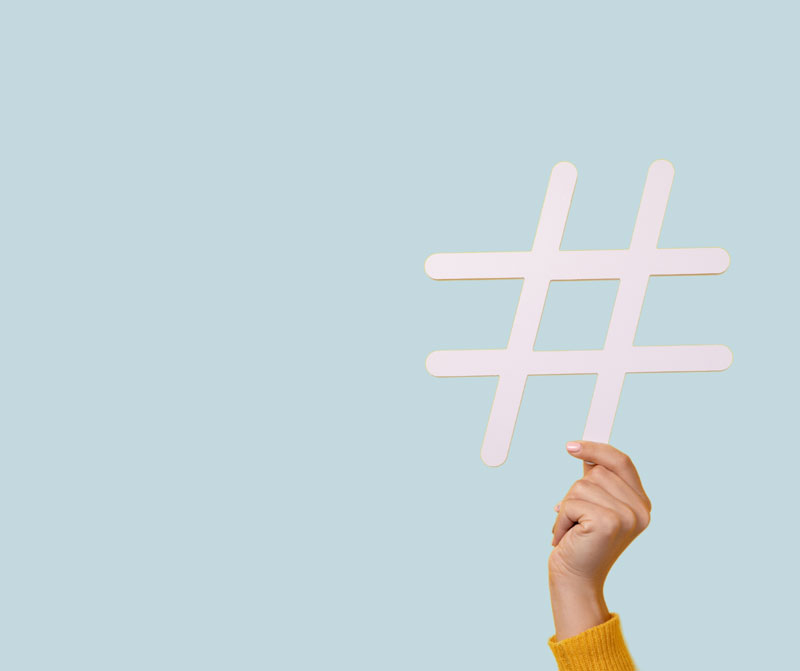You see them everywhere. Sometimes, they make sense. Sometimes, they leave you scratching your head. No matter how much you know about them, you’ve likely used one at some point yourself.
If you haven’t guessed already, today, we’re talking about hashtags.
From Facebook to Twitter to TikTok, every major social media platform uses hashtags as a tool for content categorization, discovery, and amplification. But in 2023, how useful are hashtags? That’s what we want to help clear up here.
Since its inception on Twitter in 2007, the usefulness of the hashtag has been up for debate. If you survey a group of social media professionals about whether or not you should use hashtags, you’ll get a variety of answers. You’re bound to hear anecdotal evidence from some marketers who say hashtags have helped their posts go viral in the past. Others will say hashtags don’t help them reach anyone new.
This group of passionate hashtag debaters was thrown into a bit of a frenzy last year when Instagram CEO Adam Mosseri said in a video that hashtags won’t significantly change your post reach. Some took Mosseri’s comments to mean hashtags were over, a thing of the past. But he goes on to say it’s still good practice to use hashtags when appropriate and in moderation.

So if you’re wondering if you should still use hashtags, the answer is yes, but only sometimes. Hashtags still serve their original purpose of helping users find content they’re interested in by sorting content into searchable categories. If someone is searching for content within your niche, it’s more likely they will find your post if you use a relevant hashtag. In that sense, they definitely can still help increase the visibility and discoverability of your content.
There’s also an argument to be made that hashtags can help you create a sense of brand awareness. Think branded hashtags. These can represent your brand or a specific campaign. People not affiliated with your organization aren’t likely to use a branded hashtag themselves. But, if used consistently, it’s possible to form a sense of community and brand recognition using branded hashtags. This rings especially true for bigger brands that already have a recognizable slogan.
Finally, hashtags remain useful when it comes to social listening. They can help you weed out irrelevant content when your goal is to monitor social media channels for mentions of your brand, campaigns, or industry. They can make it easier for you to track what people are saying about your brand and respond to any positive or negative comments being posted.
All that being said, we strongly believe hashtags are only truly useful when used appropriately. Here are some tips to help you know how and when to use hashtags effectively.
- Use relevant hashtags. We’ll never recommend using hashtags that have nothing to do with your content. This really only serves to annoy users by bombarding them with content they’re not interested in. For example, if you’re a restaurant posting about your new seasonal menu, #springmenu or #brunchgoals, is better than #recipes or #foodblogger.
- Use them in moderation. As Mosseri said, it’s best to keep it simple when using hashtags. There’s rarely a magic number in social media marketing, and the exact “best number of hashtags to use” changes over time, so we recommend focusing less on a specific number and more on just whittling your list down to a handful of the most relevant hashtags, somewhere in the 3-5 range. Some sources even say that using 10 or more can hurt your post reach or engagement because the platform can flag that content as spam.
- Switch it up. You don’t have to use the same 3-5 hashtags for every post. Let’s say you’re regularly using a handful of small- to mid-size niche hashtags to reach people interested in your industry. Sometimes, you might want to include a popular hashtag to hop on a trend at just the right time. Popular hashtags can be crowded, so it might be harder to catch attention, but the payoff can also be tremendous. It all depends on trends, timing, and other factors like your audience and the algorithm.
We hope this has helped clear up some of the mystery around hashtags. We’ll leave you with one principle that guides our social media team at the Sells Agency: We’re not afraid to say: “It depends.” We’re not going to tell you there’s a magic bullet solution to any social media marketing question, and that includes the hashtag debate. We believe in taking a holistic and strategic look at your specific brand and industry and factoring in the current state of social media channels and trends. These things change constantly, and it’s important to keep up with the latest news, opinions, and data.
We’re here to help guide your brand through the changes of social media as they happen, so you can effectively use social media to reach and expand your audience. At the Sells Agency, we offer social media management and consultation to help you create, maintain, and optimize your brand’s social media presence. Contact us here or give us a call at 501-666-8926 to learn more.
